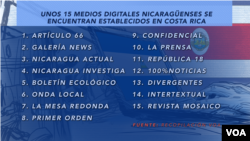The arrest of the Nicaraguan priest Oscar Benavídez, who served in one of the most remote Catholic Churches in the country in Mulukukú (North Caribbean), became known in a matter of minutes. It was the third arrest of a local religious leader in a matter of a few weeks.
Even before the Catholic Church pronounced itself, the digital media that reported on Nicaragua were already accurately reporting on the action ordered by President Daniel Ortega against the religious, whom he calls “coup plotters”.
The time of the arrest, the anomalies of the case and the anxiety experienced in the small town where the religious officiated mass were widely reported in media such as the newspaper the pressa newspaper that was previously distributed in almost the entire country but that Now it is only in digital format. The Diocese of Siuna, to which the arrested priest’s parish belongs, confirmed the information hours later.
The same has happened with other day-to-day news from Nicaragua. The few remaining local canals veto all political information for fear of retaliationsso that the resource that remains for the population to inform themselves is the digital media, including 100%Newsa TV channel whose building is under the occupation of the Ortega government.
Natalie Southwick, Coordinator of the Latin American and Caribbean Program of the Committee to Protect Journalists (CPJ), told the voice of america that although in Nicaragua there is one of the most challenging environments for the media in the region, “journalists and the media find ways, increasingly creative ways to continue informing their citizens and a global audience.”
Southwick notes that from removing bylines from stories to protect individual reporters “to transitioning and adapting their journalism to different social media platforms,” media outlets are looking for ways to continue reporting.
The expert acknowledges that although “the alternatives for feedback are increasingly minimal, journalists are looking for ways to evade censorship.”
Reporting within Nicaragua has decreased but the news continues to flow in digital media. The same goes for journalistic investigations.
Interviewed journalists explained to the VOA that the sources speak on condition of anonymity to the media.
Journalist Carlos Fernando Chamorro, director of the investigative weekly Confidential, believes that there is “a criminalization of the exercise of journalism and freedom of expression.” However, he adds that the Ortega administration “is failing” and it is partly due to citizen complaints.
He points out, for example, that although the building of Confidential “it is illegally confiscated”, its newsroom continues to do journalism.
“We cannot be silent. The best way to honor our colleagues who are criminalized, and the citizens who are also criminalized for giving their opinion, is to continue doing journalism,” said Chamorro.
In the same way, he highlights that the population has to “take care of themselves, protect themselves, not expose themselves”, but they should not be silent either, and emphasize that all the investigations that Confidential publishes “on the corruption in the regime”, are based on “leaks through public servants of the Ortega government itself”.
“There is discomfort in the government and the population, I think it contributes to more information being known,” Chamorro details.
The challenge is to reach more people through the internet
Karen Díaz has been working for the political section of the newspaper for two years the press. Like the entire editorial staff of the newspaper, he left the country recently after coverage of the expulsion of a group of nuns that triggered raids and arrests of workers in the press.
Diaz, who is also correspondent from the Colombian environment Direct Witness, maintains its sources within Nicaragua. All speak on condition of anonymity to protect their safety.
For your work with the press makes calls and monitors the political context through these sources, while with Direct Witness He goes out to report on weekends, after setting up interviews with Nicaraguan exiles or looking for stories of overcoming.
In Costa Rica, she assures that she feels safe, and can even identify herself as a journalist, something that was unthinkable in Managua.
“Reporting there was extremely dangerous. The police couldn’t see you with a phone or know that you were in a place because they came to harass you,” says Karen Díaz to the VOAwhile traveling by train to the site where he will do his next interview.
This journalist explains that she speaks freely with sources on the streets of Costa Rica and contrasts the differences regarding the work in Managua, including the coverage of the expulsion of the group of nuns in Granada.
“In the press the vehicles were not even labeled, however, the police already had a record of where we were moving. I think the repression intensified as a result of the 2018 crisis. No media outlet was labeled, except channel 10Diaz comments.
Digital media journalists also circumvent the censorship imposed by the government to prevent officials from testifying
Héctor Rosales, press officer of Current Nicaragua, points out that Ortega imposed censorship since 2007, when he came to power. Since then, journalists began to look for alternatives to obtain information, either with sources from the State or from the opposition.
Current Nicaragua recently published research on a troll farm that the Ortega government It operated through state institutions. Months later Twitter announced the cancellation of the “farms” exposed by this digital medium.
“Journalism will always reinvent itself, no matter what obstacles dictatorships put up, there will always be a way to move forward,” Rosales concludes.
Although digital media is an option for Nicaraguans, the challenge, according to press directors, is to penetrate the audience and expand it in places where there is still no internet access.
according to the website We Are Social, specialized in data analysis, the Internet penetration rate in Nicaragua stood at 44.2 percent of the total population at the beginning of 2022.
This specialized site reflects that Internet users in Nicaragua increased by 8.7 percent between 2021 and 2022.
Connect with the Voice of America! Subscribe to our channel Youtube and turn on notifications, or follow us on social media: Facebook, Twitter and Instagram.


















